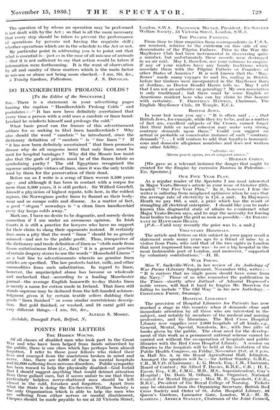DO HANDKERCHIEFS PROLONG COLDS?
[To the Editor of the SPECTATOR.] STR,—There is a statement in your advertising pages bearing the caption " Handkerchiefs Prolong Colds " and postulates :—" It has now been definitely ascertained that every time a person with a cold uses a cambric or linen hand- kerchief he reinfects himself and prolongs the cold."
What basic proof can the framer of this advertisement adduce for so seeking to libel linen handkerchiefs ? Why also should the word " cambric " be introduced, since the dictionary definition of " cambric " is " fine linen " ? If " it has now been definitely ascertained " that linen promotes disease why do all surgeons insist that only linen must be used for hospital bandages ? Why did the Mosaic law insist also that the garb of priests must be of the flaxen fabric as symbolizing purity ? The old Egyptians recognized the supreme antiseptic virtues of linen, since it was the only textile used by them for the preservation of their dead.
Before me as I write is a scrap of linen woven 3,500 years ago ; and although it has been in contact with a corpse for more than 8,300 years, it is still perfect. Sir Wilfred Grenfell, himself a physician of highest repute, tells how, in the coldest regions, the Norwegians prefer linen to flannel as their body- wear and so escape colds and disease. As a matter of fact, a good " slogan " nowadays is " a clean linen handkerchief every day keeps colds away."
Mark me, I have no desire to be dogmatic, and merely desire correction if I am under an erroneous opinion. In Irish Courts it is still a practice for lawyers who have no support for their claim to slang their opponents instead. It certainly does seem a pity that the word " linen " should be so grossly misused—and not to the public profit. Thus, irrespective of the dictionary and trade definition of linen as "cloth made from lintan usitalissimum fibre (i.e., flax) " it is a general practice of certain drapery stores to use the words" Household Linens " as a bait line to advertisements wherein no genuine linen articles arc specified. The law protects butter, milk, and other commodities from such substitution. In regard to linen, however, the unprincipled abuse has become so wholesale and unchecked that—according to a leading Manchester journal—the average English housewife to-day thinks linen is merely a name for cotton made in Ireland. That linen still stands supreme may be deduced from the left-handed acknow- ledgnient given it by certain textile sellers dubbing their goods " linen finished " or some similar meretricious descrip- tion. But gold finished, or washed, and 18 carat gold are very different things.—I am, Sir, &c., ALFRED S. MOORE.
Archdale, Donegan Park, Belfast, N.








































 Previous page
Previous page